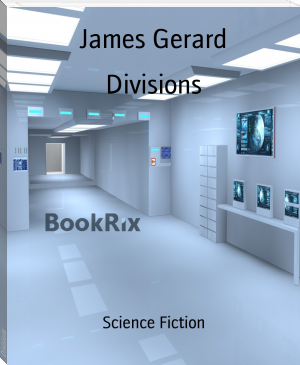Divisions - James Gerard (english love story books TXT) 📗

- Author: James Gerard
Book online «Divisions - James Gerard (english love story books TXT) 📗». Author James Gerard
In a lot of ways, he could see the building one day receiving the same fate of being shut down and condemned. It would be razed and the plot of land made ready for the newest and innovative design. That day was near. There had been much discussion from the board of regents deeming the building too old to meet the demands of the youthful aspirations of those that roamed the campus.
A sense of eagerness for the winter break broke through the building’s entrance. As he dragged the rolling suitcase up the steps, a gang of students celebrating with giggles and laughs vaulted down the steps while another gang of students rushed past him heading for the entrance. Paul fought hard to hold the concentration steady and fight against the whirlpool of excitement. He would not allow himself to get upset. It was just an expression of their turbulent stream of exuberance over the day for final examinations. With that thought in mind, he safely ascended the steps.
Reaching the door, he paused. He knew he had not prepared a final speech and wondered what could be said. The students, the group of young men and women whom he had met on the first day of the semester knew him mainly by reputation. For the remaining weeks of the course, they were only subjected to his expertise in the medical field by the post-graduate students that taught the class while he was involved with ongoing research. And although he was compliant with the request to have the students complete the final examination the week before to create an opportunity to express final sentiments, Paul believed any words would fall on deaf ears.
The hallway was dead silent as he entered. He was careful to roll the suitcase across the bare, marble floor so as not to create a distraction to those attentively attending their final examination behind the closed classroom doors.
As he approached the assigned classroom, there were no signs of moving images blurred by the opaque window of the door. There was no sound of chatter coming from within either. For a moment, he wondered if anyone had bothered to show up on the last official day of class. Surprisingly, a round of applause followed by hooting and hollering from students and faculty and friends and colleagues erupted as soon as the door was opened.
He had to admit that while the scene before him had lost its allure long ago, a circumstance that had been experienced over and over again throughout his distinguished career, this time it was touching. Rather than reacting with a polite smile and a dismissive wave of the hand, Paul decided on a gesture of gratitude. His eyes, backed up with a broad smile and a touch of red flushing the face, glinted brightly.
The rolling suitcase left by the entrance, Paul began to negotiate the steep steps of the lecture hall when a young woman came rushing up to him and offered to lend a hand of support. “Please,” he snapped, “you may consider me a decrepit old man, but I am no invalid.”
With nonstop clattering of applause, he stepped up to the lectern and took his place behind the stand. With the applause still at a roaring pitch, the coy grin of one of the members from the Board of Trustees, Raymond, was spotted in the back.
He knew instantly that Raymond was the one responsible for ignoring the request that the final session’s celebration be somewhat subdued. He had been promised that it would be tapered down to a quaint little get-together where feelings could be expressed without a showy display of sentiments. But in the end, Paul could not be miffed at the trustee for ignoring the request. Instead, he almost relished the moment and accepted the attention as humbly as possible.
“Well,” Paul started, “I have to say I am humbled by this show of…wel,l let just say this undeserved display of honor and affection. For I stand here before you on this last day, my final day, not as an irreplaceable teacher, but as a mere man. I stand here as a symbol of transition if you will, as one passing on the torch of hope from the old to the new. And just as it had been the hope of those that passed on the responsibility of defeating the maladies affecting the brain, I pass on that same hope for just not my students present today, but to my esteemed colleagues as well.
“In fact, to my students sitting here before me today and to all such students studying in colleges and universities around the world, I do expect you, you, the next generation of neurosurgeons, to accomplish what countless others before me and my colleagues in the present could not do. And while we have brought to the precipice of defeat such disabling conditions like Alzheimer, muscular disorders, strokes, epilepsy, brain tumors, dementia, Parkinson’s disease, multiple sclerosis and other disabling conditions resulting from brain injury or genetic flaws, it will be you that will deliver the final death blow.”
The room erupted. Shouts of affirmations for such a hope reverberated throughout. Students and professors, deans, the university’s president and members of the Board of Trustees came rushing in offering pats on the back and handshakes out of a deep respect and gratitude for a man that brought great fame not only for the university, but to the medical profession as a whole as well.
Raymond made his way through the well-wishers and took hold of Paul’s arm. Looking to a corner of the classroom, he ushered Paul away from the well-intended platitudes. “I’m sorry Paul,” he whispered into the ear as the applause continued, “but everyone insisted that this happen.”
“Please,” responded Paul over the clamor, “no surprises at tonight’s presentation.”
“Of course not. There will be just a short dedication, a quick speech by you, then a night of wine and song.”
“You promise?”
“Well, I should not be telling you this, but I do want to give you advanced warning. Our most mysterious and generous benefactor lo these many years, he will be in attendance tonight and has made it known he would like to meet you.”
“Interesting,” quipped Paul, “after all these many years why would he choose to reveal himself now?”
“I cannot say. But I would be curious to find out.”
“Raymond, my old and dear friend, keep in mind my age. This day has taken its toll. I simply do not have the strength to endure a long night of more of this.”
“Yes, yes, I do understand. But I beg you, no matter at what time he shows, you must be there to meet him.”
Paul let out a sigh, rolled the eyes, and then looked to Raymond. “Your mind is always on ways of retaining our generous benefactors you old trickster you?”
“Why of course. My friend, this university has not attained its fine reputation based on research alone; we need his generous contributions.”
Paul knew Raymond was right, yet he felt that his time was not only over as a professor, but as carrot being dangled from a stick as well. Years ago, when he truly wanted to retire, he allowed Raymond to persuade him to stay. He convinced him to squeeze out the very last ounce of knowledge for the future generations. And although the true intentions as to why he needed to stay were never brought to the forefront, Paul extrapolated this information by witnessing the building of modern research facilities and all the latest medical equipment and gadgetry that came with it and now the new modern library. Of course, all made possible with the generous contributions.
He looked to Raymond. “Okay, I believe I can manage the strength one more night. But be warned, this will be the last time.”
“Of course Paul. You above all others have deserved and have earned your time of rest.”
Paul turned to the crowd of well-wishers. Some were still milling around while others were engaged in polite conversation. “May I have your attention,” he shouted with all his strength. “Thank you all for coming today, and to my students, I wish the best for all of you.”
A short round of applause followed. Slowly the crowd of students and faculty members and colleagues dispersed along with Raymond.
A Proposition
“Darn thing,” Paul grumbled. He focused on the bow tie staring back at him from the mirror, then at the hands struggling to fashion the knot just right for the formal affair. Finally, the slippery fabric was manipulated enough to appear somewhat acceptable and the knot quickly tightened. Yet, as he stared at the finished work, he could just see Joyce throwing up her arms and grumble “some brain surgeon you are.”
Although the crushing pangs and longings for his departed wife, his one and only love, had dissipated over time, Paul realized that it was at times like these when he missed Joyce the most. The memories of her managing what he had always thought as the simple things now were known as anything but simple. And what made the memories worse was she never complained. She went about her life with an unyielding devotion to carry out the daily, mundane tasks just so that he could pursue a passion disguised as work.
He stood in front of the mirror staring at the reflection. Paul was ashamed over the inability to do the simplest things as to tie a bow tie. And in that moment he realized that it was not him staring in the mirror, but it was the reflection that was staring at him with a look of contempt. As if the image were his twin chastising him for never seeing Joyce’s ability to persevere through all the loneliness and pure frustration of managing a household without much help from him. That he was lucky she chose to stick to the vows of a marriage with a man who spent so little quality time with her as a husband at home. That through the absences she willingly doubled her parental responsibilities by stepping in and fulfilling the duties of a father to subdue the antics of five lively boys. He turned away in disgust and whispered, “You never deserved her.”
That’s when it all fell apart, he thought. Paul cringed with mental pain as he could not stop the memories from rushing in. Even during her battle with breast cancer and the struggle for which he could do nothing for her except to leave it up to the expertise of the specialists, he marveled that her thoughts and mind remained sharp as the body became fragile. The best he could do was request a sabbatical and stay by the bedside and offer encouragement and love. But despite the show of strength, it was too late. The thoughts jabbed at his soul as he envisioned her slowly succumbing to the weakness day by day. The will to sustain the fight came to an end.
The memories gave way to the mess scattered about the bedroom. All his sons at one time or another had discussed the state of disrepair of the house and offered ways on how to resolve the mess, but Paul reared





Comments (0)